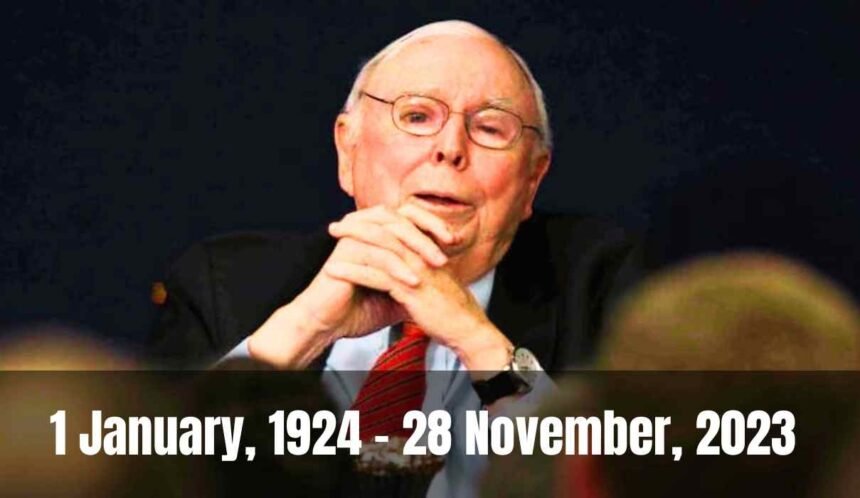Investing legend Charlie Munger passed away on Tuesday at 99 years old, leaving behind an incredible legacy of wisdom. As vice chairman of Berkshire Hathaway, Munger was Warren Buffett’s longtime business partner and confidant. He was renowned for his thoughtful insights on investing, business, and life.
Though Munger is no longer with us, the sage advice he imparted over his lengthy career lives on. From betting big on your best ideas to avoiding toxic people, here is some of Charlie Munger’s most memorable and impactful advice.
#Advice 1: Go All In On Your Best Bets
“When you know you have an edge, you should bet heavily,” Munger once stated. “They don’t teach most people that in business school. It’s insane. Of course you’ve got to bet heavily on your best bets.”
This quote encapsulates Munger’s aggressive investing philosophy. Rather than diversify, he believed firmly in making concentrated bets on your highest conviction ideas.
That means putting the bulk of your capital behind opportunities that you have thoroughly vetted and have an informational or analytical advantage on.
While risky, Munger felt going all in on best ideas was the key to outsized returns over time. It’s an approach that served him and Buffett extraordinarily well for decades.
#Advice 2: Cut Toxic People Out Of Your Life
“The great lesson of life is get them the hell out of your life — and do it fast,” Munger bluntly stated when referring to toxic people. He knew that negative people who lie, take advantage of others, or spread misinformation drag everyone down.
Associating with disreputable people not only jeopardizes your reputation, but can infect your mindset and undermine your success. It’s why Munger advocated removing toxic people from your life swiftly and entirely. Though harsh, it’s advice that can profoundly improve anyone’s life when followed.
#Advice 3: Seize Your Opportunities
Munger knew that window’s of life-changing opportunity open infrequently. “There are maybe five, six times in a lifetime when you know you’re right, you know you have one that’s really going to work wonderfully, and you get a chance to do it,” he stated, adding “People who do it two or three times early, they all go broke because they think it’s easy. In fact it’s very hard and rare.”
His guidance here is to make the absolute most of the few chances you get to invest in an outstanding business or idea. Don’t assume such opportunities will keep recurring. Capitalize fully when they appear, even if it means going all in.
For those who hit on a couple big wins early on, guard against complacency or overconfidence. Lightning rarely strikes the same place multiple times in a row.
#Advice 4: Read Voraciously
“In my whole life, I have known no wise people who didn’t read all the time — none, zero,” Munger emphasized. Reading extensively across a breadth of disciplines is foundational to building knowledge and cultivating wisdom over time.
Information and skills compound, much like money in an investment account. The more you read, the smarter you get. Had Munger not read voraciously throughout his life, he would never have attained his legendary status.
#Advice 5: Think In Principles
“The first rule is that you can’t really know anything if you just remember isolated facts and try and bang ’em back,” Munger warned. Memorizing trivia or details without proper context leads nowhere.
True knowledge and understanding come from piecing together core principles that govern a domain. Connecting facts into causal models and systems builds transferable reasoning ability.
Isolated facts rot in your mind without reinforcement. But principles endured in Munger’s vast mental models, fueling brilliant decisions for years.
#Advice 6: Leverage Time And Persistence
On obtaining unusually successful outcomes, Munger noted “It takes all three to get them on this list of the super successful. How can you arrange to have two or three episodes of good luck?
The answer is you can start early and keep trying a long time, and maybe you’ll get one or two.” While natural skill and hard work are prerequisites, even the best need luck sometimes.
Munger’s formula is to play the odds – start early, persist for decades, capitalize on periodic lucky breaks. That combination resulted in Munger becoming one of the world’s wealthiest and most admired investors.
#Advice 7: Commit To Lifelong Learning
“The game of life is the game of everlasting learning. At least it is if you want to win,” Munger espoused. Complacency and arrogance are lethal. To stay on top, you must perpetuate gaining knowledge.
Munger studied successful disciplines voraciously late into life, always humble enough to admit how little he knew relative to the scope of human knowledge. He read broadly across mental models and integrated interdisciplinary synthesis.
Had Munger closed his mind early on, he would never have achieved such investment greatness. Intellectual curiosity and a thirst for continuous learning were central to his genius.
#Advice 8: Avoid Sloth And Unreliability
“What do you want to avoid? Such an easy answer: sloth and unreliability. If you’re unreliable, it doesn’t matter what your virtues are. You’re going to crater immediately,” Munger warned.
Being lazy and irresponsible are surefire ways to ruin your goals and dreams. Do what you say you will do, follow through on commitments, pull your weight when working in teams – that’s how you gain a stellar reputation.
Success and achievement happen only through disciplined effort and grit. Munger had no patience for slackers or all talk, no action types. Back up your words through dedicated work.
#Advice 9: Stay Cheerful Despite Troubles
On habits needed to succeed in life, Munger listed “You stay cheerful in spite of your troubles.” When tough situations arise, it’s easy to let negativity overwhelm you. But yielding to despair accomplishes nothing.
Analyze problems dispassionately, then move forward with optimism and enthusiasm. Difficulties are inevitable – no one escapes unscathed. What separates the best is they retain an upbeat, constructive spirit even amidst turmoil.
That poise lets them overcome challenges and bounce back stronger than ever. Munger knew keeping emotions in check and seeing the bright side was key to flourishing.
#Advice 10: Deal With Reliable People
In the same list, Munger highlighted dealing only with reliable people. Time is your most precious, non-renewable resource. Dealing with unreliable contacts squanders it and inflicts needless frustration.
Instead, Munger filtered rigorously for integrity and responsibility – these compound over years into meaningful ventures. Judge people based on their track records, not charm or promises. Actions, not words, determine outcomes.
By collaborating only with competent, trustworthy partners, Munger avoided headaches while building long-term relationships scaling success.
#Advice 11: Do What You’re Supposed To Do
Rounding out Munger’s list for succeeding in life was simply “You do what you’re supposed to do.” Ignore surface level wants for deeper fulfillment from acting properly and ethically.
Duty supplies meaning and direction. Even when inconvenient or requiring sacrifice, adhering to responsible choices cements identity and self-respect. Pressures often push our ethical boundaries – in those moments, take the high road.
A clean conscience rewards itself, as Munger proved by becoming fabulously wealthy through ethical discipline.
#Advice 12: Pursue What You Have Passion And Aptitude For
“You’ll do better if you have passion for something in which you have aptitude,” Munger stated. “If Warren had gone into ballet, no one would have heard of him.”
The investing legends’ fortunes would have differed drastically had they pursued fields unaligned to their innate talents. Identify your specialized abilities, then direct them towards domains you care deeply about.
At the intersection of talent and interest lie life’s greatest rewards. Allow your enthusiasms and natural strengths to magnetize you toward fulfilling ventures.
#Advice 13: Go All In On Best Ideas
In investing specifically, Munger noted “The goal is to find situations where it is safe not to diversify. If you only put 20% into the opportunity of a lifetime, you are not being rational.
Very seldom do we get to buy as much of any good idea as we would like to.” Again, he doubles down on concentrating your capital only in the most conviction weighted opportunities within your circle of competence.
Owning a small chunk of even a phenomenal business is playing it too safe. Go all out to seize the few chances you get to secure a large stake in a bonafide winner.
#Advice 14: Avoid Self-Pity
On mindsets damaging to success, Munger warned “Self-pity gets fairly close to paranoia, and paranoia is one of the very hardest things to reverse. You do not want to drift into self-pity. … Self-pity will not improve the situation.”
When faced with hardships, too many descend into ‘woe is me’ sentimentality. But self-pity is a destructive indulgence with no upside. It distorts rational thinking and sinks motivation.
Strike it from your mental repertoire, refusing to wallow. Maintain an empowered, proactive perspective and drive forward. The disciplined avoid pity-parties and stay solution oriented.
#Advice 15: Select The Best Suitor
On investing in the best opportunities, Munger related “If you’ve got two suitors who are eager to have you, but one is way better than the other, you’re going to choose that one rather than the other.
That’s the way we filter stock buying opportunities. Our ideas are so simple.” In business, talent and capital flock to the most promising ventures. Rather than spread yourself across mediocre options, identify and secure the single best opportunity through decisive action.
Be attracted only to the most qualified suitors. This filters out inferior prospects so you clinch the optimal selection.
#Advice 16: Liabilities Are Always 100% Good
On financial health, Munger quipped, “The liabilities are always 100% good. It’s the assets you have to worry about.” Debt drives growth by leveraging up earning assets, but only if cashflows suffice to service interest costs.
Too many promising ventures fail by taking on excessive liabilities relative to the reliability of their earnings streams. Managers must worry first about asset quality and realistic projections.
Debt is gasoline – used judiciously, it propels growth; carelessly applied, it combusts spectacularly. Munger’s lesson is liabilities have no risk in isolation – the risk lies in poor underwriting of assets.
#Advice 17: Success Is Simple But Rarely Easy
“It’s so simple to spend less than you earn, and invest shrewdly, and avoid toxic people and toxic activities, and try and keep learning all your life, and do a lot of deferred gratification.
If you do all those things, you are almost certain to succeed,” Munger emphasized. “If you don’t, you’re going to need a lot of luck.” His formula seems basic, but few execute it with consistency over decades.
Human naturepreference’s short term pleasures over delayed rewards. Munger succeeded largely by suppressing that instinctive bias – studying and learning continuously, controlling emotions, judiciously accumulating assets, minimizing mistakes. Uncommon discipline, not inherent genius, set him apart.





